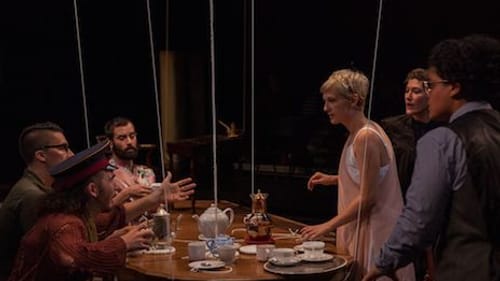Stay in the Loop
BSR publishes on a weekly schedule, with an email newsletter every Wednesday and Thursday morning. There’s no paywall, and subscribing is always free.
Living in oblivion
MJ Kaufman presents 'Destiny Estimate'

We’ve all devised an answer to the “dream dinner party” question, that perennial favorite of magazine interviewers and talk-show hosts. Real or fictional, living or dead: who gets a place at your table? In Destiny Estimate, playwright MJ Kaufman welcomes Antigone, Louisa May Alcott, Mother Courage, and Blanche Dubois to their imaginary salon.
This is no scattershot grouping. A playwright who infuses their work with intelligence and impishness — sometimes too much of both — Kaufman uses these heroines of history to examine their true overarching subject: human interaction with death. Each of the fictional characters has a special relationship with this issue, and the theme punctuated Alcott’s life and work.
Don't fear the reaper
They should be ideal tour guides for Myles (Paloma Irizarry, overly tentative), the playwright and academic at the center of Destiny Estimate. Like many creators, Kaufman uses their understanding of and interactions with art to make sense of their world. But Kaufman too often bogs down the narrative with these characters and the theories behind them, eclipsing the more interesting question at the center of the play: “Why are [we] so interested in preventing death?”
Myles tells the audience, “Every play I’ve ever written has been about a dead person in my life,” and Destiny Estimate has a pretty high body count. The deceased include a childhood friend and promising poet who died under suspicious circumstances; a roommate who perished in a car accident (those words sound to Myles “like a twig snapping”); and Myles’s father, who succumbs to amyotrophic lateral sclerosis (ALS), a disease whose hereditary specter haunts the play.
Destiny Estimate soars when Kaufman allows the ghosts to speak with their own voices. Mary Tuomanen prettily intones the poet’s elliptical verse, layering in a sense of aching sadness. Melissa Krodman brings levity to Myles’s grandmother, whose intermittent phone calls feel like comic relief from the great beyond.
Perhaps the most moving moment comes when Myles continually revises a monologue for his father, whom Jenna Horton plays with a finely wrought sense of restraint. In each successive take, Kaufman pares down the speech from a glorious paean to the simple joys of life to an ever-shrinking assortment of the words this once-vital man still possesses. It mirrors the subtle ravaging effects of ALS, which takes and takes until little remains.

What a swell party this is
But too often Kaufman seems intent on showing us how erudite they are. This takes the form of mini-lectures, where Myles dispatches rudimentary readings of Aristotelian and Brechtian theories of fate, predestination, and the degree to which people and characters can control their own narratives. Some confidence on Irizarry’s part would have helped smooth these moments, but she frequently seemed textually and intellectually unsteady.
Kaufman also doesn’t use their historical guests to the best effect. This device works with Alcott, whom Krodman plays with sly humor; Kaufman invents a hybrid version of the celebrated author, with one foot in the 19th century and the other in the redeye-catching, Uber-calling present. Because Alcott isn’t bound to an existing authorial voice, her presence doesn’t feel shoehorned.
Daniel Park’s Mother Courage confuses volume for meaning, and Kevin Meehan’s Blanche feels like a straight guy’s unsure interpretation of camp. Tuomanen doubles as Antigone, beautifully reading lines from the character’s final speech (I’d like to see her play the full role someday). Tuomanen, Jenson Titus Lavallee, and Jackie Soro also appear as the Moirai (Fates) of Greek mythology, for no apparent reason.
Kaufman co-directs the play with Mark McCloughan. They use the unique Christ Church space inventively, turning it into a long tunnel where the realms of the living and dead coexist and occasionally overlap. Katherine Fritz’s simple but memorable costumes also reflect this: they individuate the real characters from their imagined conduits. Masha Tsimring’s lighting creates a speculative mood, plunging the audience into deeper darkness when Myles turns meditative. At other times, it enters a high key, forcing us to examine the project’s overall sense of artifice.
It’s a visually arresting production that moves swiftly over 80 unbroken minutes. But the overall endeavor hangs together loosely, and this doesn’t suggest the messiness of life and death; it suggests a writer who wants to have their cake, eat it, and then go back for seconds.
That’s a shame, because what works in Destiny Estimate shows talent, good judgment, and a standard of taste. But as the evening progresses, those moments feel more and more like refugees from the play you wish you were seeing.
[Ed. note: Kaufman and their production team requested that critics not review this show. For more on that controversy, click here.]
What, When, Where
Destiny Estimate. By MJ Kaufman, Kaufman and Mark McCloughan co-directed. Through October 29, 2017, at the Christ Church Neighborhood House, 20 N. American Street, Philadelphia. Destinyestimate.com.
Sign up for our newsletter
All of the week's new articles, all in one place. Sign up for the free weekly BSR newsletters, and don't miss a conversation.

 Cameron Kelsall
Cameron Kelsall